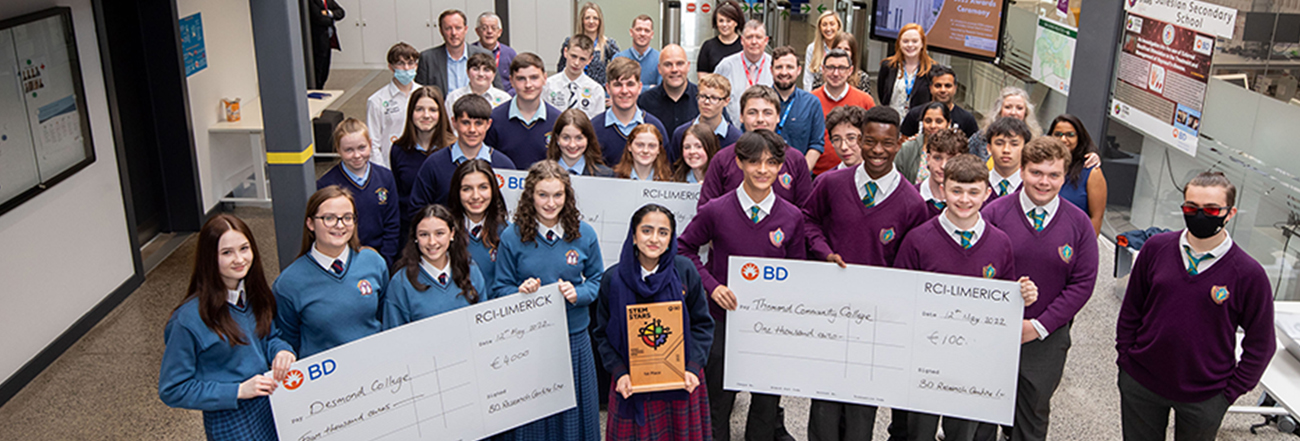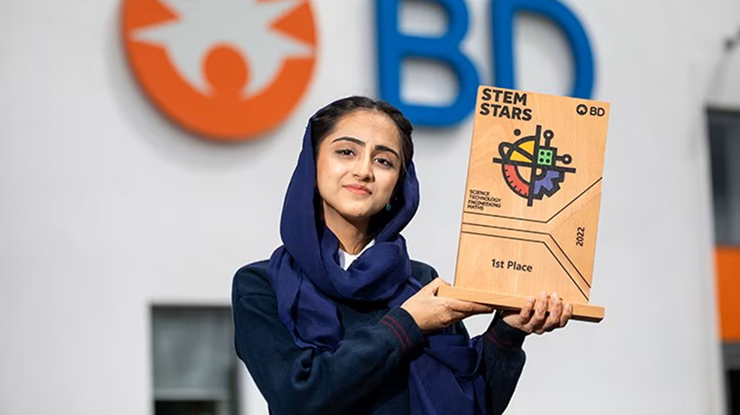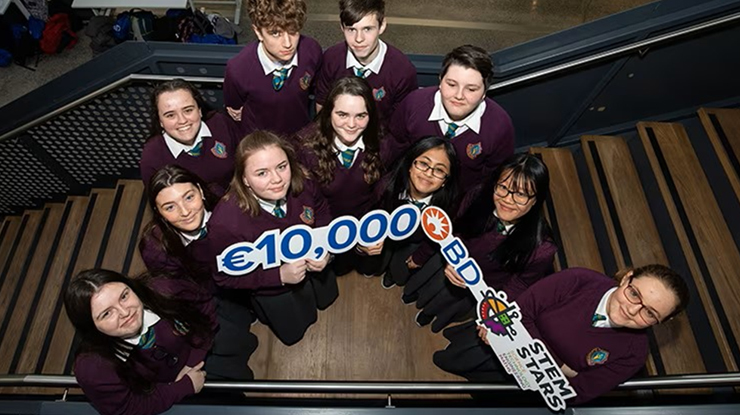STEM Stars
BD STEM Stars aims to inspire and encourage students in the areas of Science, Technology, Engineering and Maths. People who pioneer and create in these areas are capable of incredible advances in the world of health. BD support programs that foster future talent, and as such feel passionate about community-based initiatives like STEM Stars. This year we are happy to announce the competition is open to all secondary schools within the Munster region.
There is a total prize fund available of €20,000 to support and develop STEM education in the winning schools. On an annual basis student prizes to the value of €2000 are reviewed and made available at the discretion of BD RCI. This prize will be distributed to the students in the form of vouchers for technology or products that support continued learning in the areas of STEM.
This year BD have put together a template to assist the students in putting together their projects. Download and fill in the template and include within your submission.
What are we looking for?
Can you identify a healthcare problem that you would like to solve?
BD is looking for creative and innovative ideas that tackle key healthcare problems. Any solution can be submitted, whether it be an idea, a fully working prototype, or anything in between. The submissions should include a short video between 2 and 5 minutes. Be creative and fun with the video, it should be engaging but also detail key problem areas and the applicant's approach to solving the identified issue.
We would like to acknowledge and thank Limerick and Clare, Education and Training Board (LCETB) for their valued contributions and continued support in the success of this initiative.


2023 Winner: Desmond College
Madison Saracoglu & Emma Greaney won the 2023 BD STEM Stars competition with their project called 'Rehabilitation Nation'. After extensive research around the issue of shoulder mobility and a review of existing solutions, their idea won them the coveted first place at the STEM Stars finals in BD Research Centre Ireland.
Their solution is a device that assists and tracks patients' progress in regaining shoulder mobility. They tested it in the field with physiotherapists and patients, and have taken it a step further by gaining a patent for their design. These students were passionate and determined and won the judging team over with their knowledge, ambition and execution.
2022 Winner: Colaiste Nano Nagle
Maha Shahzadi won the 2022 BD STEM Stars competition with her innovative app for visually impaired people that allows them to shop for their groceries while keeping track of any dietary requirements they may need.
She conducted research to ensure the app she developed had the most helpful features. Her research highlighted the need to have features for accessibility such as increasing text size, high contrast mode and text-to-speech features.
Once she had all the information gathered and assessed, she developed a wireframe for the app "Eataware" and then moved on to create the app. Eataware has a minimalistic user interface and features to allow users to scan their food labels and browse stores with the app.


2021 Winner: Desmond College
Desmond College won the STEM Stars competition with its project tackling teenage obesity. They highlighted the average time spent online and how it contributed to areas such as poor achievement of development milestones, higher likelihood of inadequate sleep, lower scores on thinking and language tests, and emotional stability issues.
They gathered data using the Central Statistics Office and created their own survey which showed a lack of exercise in young people caused by an increase in screen time. They then developed a device, using a micro:bit computer that would be worn like an activity tracker and monitors active minutes such as running or walking. Once a goal was reached, the device would reward the teenager with 15 minutes to use a smart device or console by enabling the power to the device. They also developed another device that allowed the parents to reward the teenagers with additional time to be used on their devices.
2020 Winner: Thomond College
Thomond College won the inaugural STEM Stars competition with their entry where they tackled stress and anxiety in teenagers. They performed interviews and online surveys with students to gain more data on what causes stress and anxiety in students. They also designed an experiment to prove that tests cause stress whereby they gave one of their classes a surprise Maths test, which showed higher heart rates and stress afterward.
Aiming to reduce stress, they researched sensory environments and light therapy. They deduced that light therapy, specifically blue light, can be therapeutic and calming. They programmed a micro:bit microcontroller to control a ZIP halo LED ring light to output blue light, and designed a phone case that would enable students to use their phones to output blue light therapy. They used seven subjects to understand mental health and stress and how to tackle it in students.

These Terms and Conditions are known as the 'Rules'. The Rules apply to BD school's competition - STEM Stars, and by entering the competition you agree to be bound by the Rules.
- The BD school's competition - STEM Stars, is open to secondary school teachers and students (under the age of 19) who are attending school in the Munster region in the Republic of Ireland and who are residents of this county.
- Multiple entries from each school are allowed, however only entry can win a top prize. If multiple entries are in the running for one of the top prizes the judges will select the highest scoring entry out of that school.
- Entries can be from individual students or groups. The maximum group size is 8 students.
- The competition is not open to judges, their family members, their agents or anyone professionally associated with judging the competition.
- Total prize fund available of €20,000 to support and develop STEM education in the winning schools. The prize fund cannot be exchanged.
- Registration is by email at [email protected]. Finalised submissions should be uploaded using the link, username, and password supplied after registration.
- The prize is subject to availability and in the event of circumstances outside of its control, we reserve the right to substitute similar or alternative prizes of equal or greater value.
- All entries will be submitted for review by the judging panel. The judges' decision will be final and no correspondence will be entered into.
- Entries that are incomplete or those that are not in accordance with all the entry instructions will be invalid.
- BD reserve the right to disqualify an entrant if it has reasonable grounds to believe that the Rules have been compromised.
- All submitted entries should be original work and previous STEM Stars competition topics should not be repeated.
- By entering this competition, you agree that BD and/or their agents reserve the right to use your entry for any promotional purpose. You confirm that your entry is an original work that you own. The winner will also be required to take part in publicity resulting from this competition.
- BD reserves the right to cancel or amend the competition and these terms and conditions without notice.
- No purchase necessary.
- Entries to the competition should be made in video format (max. 5 minutes) with the BD supplied project template outlining the problem, proposed solution, experimental methods, results and reference materials.
- The images/videos resulting from the photography/video submitted as part of the competition and from photography/video during the judging process, and any reproductions or adaptations of the images for publicity purposes, will be publicity to recognise the participants in STEM Stars and to promote the initiative and encourage other schools to get involved. This might include (but is not limited to) printed and online publicity, TV and video, social media, press releases and images on the BD Stem Stars website.
- Videos submitted may be used for promotional purposes. Anyone attending the prize giving ceremony agree to allowing BD to use these images/videos unless otherwise agreed.
- BD may want information pertaining to how schools use the prize fund for promotional purposes and thus schools entering the competition agree to provide this information if requested.
Registration is open, click the link below to register your interest.
The following information will be required:
- School's name
- Teacher's name, phone number and e-mail address
- Student's name(s)
- Project name




